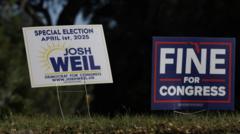As the potential implementation of new tariffs nears, US firms express a mix of support and caution regarding President Trump's strategy, aiming to address trade imbalances while fearing backlash from foreign trade disputes.
US Companies Demand Action on Trade Imbalances Amid Trump’s Tariff Strategy

US Companies Demand Action on Trade Imbalances Amid Trump’s Tariff Strategy
Businesses voice concerns over tariff policies as they seek protections from foreign competition.
In a landscape dominated by trade negotiations and looming tariffs, American companies are increasingly vocal about the imbalance in export regulations, particularly in relation to the European Union. A case in point is JM Smucker, a major producer of fruit spreads, which highlighted the steep 24% import tariff on its products in Europe. In a recent communication to the Trump administration, Smucker’s representatives argued for reciprocal tariffs on EU-jams to create a level playing field, given that US tariffs on jams are significantly lower at 4.5%.
The discrepancies in these tariff rates have raised eyebrows within various sectors, as Trump pushes for tariff implementations amidst a backdrop of mounting frustration with foreign competition and their trade policies. The White House has received hundreds of letters from businesses highlighting the disparities, including apple farmers facing better tariffs in countries like India and Brazil, and oil lobbyists targeting regulations in Mexico.
While some companies have registered their grievances, the looming threat of retaliatory tariffs causes hesitation. Trump’s vision of a "Liberation Day," heralding his tariff announcements, has prompted mixed reactions. Even as he hints at future tariffs, which some expect to be made official on April 2, many businesses worry such policies may restrict their access to key imports.
Some industry experts express skepticism towards Trump's methods, fearing a trade war may emerge instead of the intended negotiation leverage. Noteworthy is the situation in which interests often clash; while steel manufacturers push for broader tariffs, they simultaneously request exemptions for essential materials.
The Republican party, despite traditionally advocating for free trade, is rallying behind Trump's approach. Figures like Representative Jodey Arrington acknowledge the potential short-term pain but stress the long-term payoffs for American workers and manufacturers.
With April 2 fast approaching, the focus remains on whether Trump's sweeping tariff strategies will yield the desired outcomes without inflicting economic harm on various sectors, as the balance between protective measures and market accessibility continues to pose a complex challenge for US businesses.





















